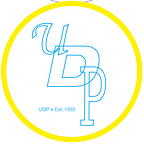CARL SCHLACHTE ON CORINA COPP’S PRO MAGENTA/BE MET
Ugly Duckling Presse is inviting artists and writers to respond to their favorite titles for our backlist blog series From the Vaults. Our eighth contributor is Carl Schlachte, with a reading of Corina Copp’s Pro Magenta/Be Met (2011).
Corina Copp’s Pro Magenta/Be Met, I mean the chapbook itself, is roughly the size of an over-large cell phone. Sometimes when I hold my own, slightly smaller cell phone, I have the sense of a limitless depth extending down through my hand, into the floor, and onward — a depth from which the information I can call up emerges. Holding the chapbook of Pro Magenta/Be Met to read it feels similarly, with the thin columns of text that make up each of these two poems, stitched together, sliding downward in a dizzying drop.
My favorite thing about these two poems by Copp is their prosody, which is both relentless (each poem is devoid of punctuation that might slow us down — it mainly uses the occasional comma to speed us on), and fractal, continuously breaking off and turning in different directions. This movement is simply fun, because it feels like Copp is giving us the frenzy of an agile mind at work, sometimes chasing a thought to its end, and other times branching out or nesting endlessly. There are several long parentheticals in “Pro Magenta” that test how far ideas can be buried in other ideas. At other moments, short parentheticals stack up, pressing in on one another:
After the symposium
Carved long scars
The author on using
Heresy to mutate
Sufficiency’s going
Form stood before
My indifferent lid (now
Aging me) To
(Oh delicate hands)
Constantly refer to and
Understand each other
In a bind, we should
Say what we think
The man thinks while
Seated next to the
Man himself
— p. 8–9
The turning in different directions that I enjoy so much in these poems is a product of the syntax, too, which fizzes off like a firecracker, in a dozen different directions, turning at each line end:
I see mallard end I
See my liege
Leitmotif allergen I see
My gentle it’s
An agent is
Coloring her lips in
With this color
— p. 5
The experience of reading lines like these is to be pushed to go back and re-read the lines that preceded them, just to see how we got where we did. But while “Pro Magenta” favors the move of turning, “Be Met,” its twin and inverse (the two poems are bound dos-a-dos) forces bridges across the lines, breaking and hyphenating words to force multiple readings:
Still I only mention
Her before our
Gratitude
For each other
Makes it easy
Go steel, go
I had my hand
In it, my hand
In the pottery
I told you about
The small jar I
Felt was my hard
And solid earth-
Enware soul mate
— p. 8
These quotations are long, and I could probably get away with shorter ones. Part of the difficulty is the quickness of the line: none is more than a handful of words long, and their narrowness suits the pages they are set in. But another source of difficulty is my own resistance to quoting any portion of the text that would seem to fit too neatly, mostly because I suspect Copp would hate me for doing so. Even at their most aphoristic, these lines sit alongside others that make any overly-tidy reading unfathomable; more than anything, Copp seems interested in pushing the language in these poems, forcing it to do acrobatics by juxtaposing as many different images as she can. For example, I love the compact, almost-reflective moment in “Be Met” where she writes:
Depending on
Whether I resent
Ephemeral dusk
That dusk or not
All who love cities
Are selectively pass-
Ionate, used navy
Repeated used navy
— p. 14
The “used navy” may be the color of dust, or of the cities — and it may be repeated in these places, or it may simply be a comment on the poem’s own making. Of course it is all of these things at once — Copp rarely seems content with simplicity or directness.
A rare moment of sustained clarity ends “Be Met”; Copp writes:
I wonder if Lina
Wertmüller had
Seen Marcel
Carné’s Port of
Shadows when she
Made Swept Away,
As the films end the
Very same, some-
One gone, shot or
Left, someone
Alone, sitting fit-
Fully how could
You leave me all
Alone? At this port?
This port?
Class and the
Fog one has
— p. 15
As an observation about European cinema, it stands, but as a comment on endings, it seems to reflect the alone-and-separate nature of the two poems in the chapbook itself — each poem ending up left by the other, unless we choose to flip the book and keep reading. Similarly, Copp stifles the ending of the poem — swinging through the neat question and into the “Fog one has”; closure confounded.
Carl Schlachte is a teacher of writing and rhetoric who lives and works in North Carolina. Previously, he served as a UDP development apprentice and as the letterpress typemaster.
